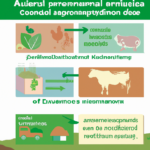The section focuses on the use of natural barriers and biofertilizers in organic farming. Natural barriers offer protection against pests and extreme weather conditions, while biofertilizers enrich the soil with essential nutrients. These agricultural products promote sustainable and environmentally friendly agriculture, contributing to soil health, biodiversity and crop resilience.
In the current era, where sustainability and environmental protection are global priorities, organic farming has emerged as a viable solution to ensure the production of healthy food while minimizing environmental impact. This article will delve into a specific organic farming strategy: the implementation of natural barriers to protect crops. Likewise, the synergy between these barriers and the use of biofertilizers, which are essential to maintain soil health and productivity, will be explored. Through the sections of the article, a detailed view will be given on how natural fertilizers complement the implementation of natural barriers, the role of agricultural products in this ecological approach, and the importance of these practices in crop protection. In the end, readers are expected to understand the relevance and benefits of adopting strategies such as natural barriers and the use of biofertilizers in organic farming.
- 1. "Use of Natural Barriers and Biofertilizers in Organic Agriculture"
- 2. "How Natural Fertilizers Complement the Implementation of Natural Barriers in Crops"
- 3. "Products for Agriculture: Natural Barriers and Fertilizers to Protect Crops"
- 4. "Organic Agriculture: Protecting Crops with Natural Barriers and Biofertilizers"
1. "Use of Natural Barriers and Biofertilizers in Organic Agriculture"
The use of natural barriers and biofertilizers in organic farming is a growing and promising practice that allows farmers to protect and nourish their crops in a more sustainable and environmentally friendly way. Natural barriers, such as shrubs, trees and hedges, act as physical protectors against pests and extreme weather conditions, while providing habitat for beneficial wildlife. On the other hand, biofertilizers, which are a natural and ecological alternative to chemical fertilizers, improve soil health and crop productivity by enriching the soil with essential nutrients and beneficial microorganisms. Together, these agricultural products not only promote ecological and sustainable agriculture, but also contribute to the improvement of soil health, biodiversity and the resilience of crops to diseases and climate change.
2. "How Natural Fertilizers Complement the Implementation of Natural Barriers in Crops"
Organic farming is concerned not only with the protection of crops through natural barriers, but also with their nutrition and growth. This is where natural fertilizers or biofertilizers come into play. These agricultural products, rich in nutrients and beneficial microorganisms, provide plants with the essential elements for their development, thus enhancing the effectiveness of natural barriers. Natural fertilizers, by improving soil health and plant resistance, act as an additional shield against pests and diseases. In this way, biofertilizers and natural barriers complement each other, achieving more effective and sustainable protection for crops.
3. "Products for Agriculture: Natural Barriers and Fertilizers to Protect Crops"
In the world of organic farming, agricultural products play a crucial role in protecting and improving crops. Among these, natural barriers and fertilizers stand out for their effectiveness and respect for the environment. Natural barriers, such as live fences and hedges, provide a line of defense against soil erosion, strong winds and various pests, while enriching the biodiversity of the environment. On the other hand, fertilizers, especially biofertilizers, are essential to enrich the soil with nutrients, improve its structure and stimulate healthy plant growth. These agricultural products, being natural, not only protect and nourish crops, but also preserve the health of the soil and the ecosystem in general, which is essential for sustainable and productive agriculture.
4. "Organic Agriculture: Protecting Crops with Natural Barriers and Biofertilizers"
Organic farming, also known as organic farming, is revolutionizing the agricultural landscape by promoting sustainable and environmentally friendly growing practices. A crucial component of this trend is the use of natural barriers and biofertilizers to protect crops. Natural barriers are an effective way to protect crops from pests and diseases without resorting to harmful chemicals. These may include hedges, stone walls or even some plants that repel pests. On the other hand, biofertilizers, which are an alternative to conventional fertilizers, provide essential nutrients to crops in a more sustainable and safe way. These agricultural products are made from living organisms that improve soil fertility and plant health. Together, these organic farming strategies enable healthier, more sustainable agricultural production, protecting both our planet and consumers.
In conclusion, the implementation of natural barriers accompanied by the use of biofertilizers is an effective and sustainable strategy to protect crops. This practice, essential in organic farming, contributes to the prevention of diseases and pests, improves soil quality and promotes biodiversity. Natural fertilizers, for their part, complement the action of natural barriers by providing plants with the nutrients necessary for their growth and development. In summary, the combination of natural barriers and biofertilizers is an effective and ecological solution for crop protection. There is a wide range of agricultural products on the market that facilitate this implementation. As organic farming continues to gain ground, we are likely to see an increase in the use of these practices, which not only benefit farmers, but also the environment and consumers.


